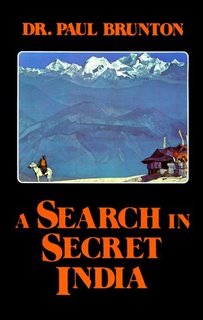Search in secret India
I suppose everyone goes through a phase in life when they wonder what they are doing on this planet. It happens when your basic needs have been met, when you start integrating yourself into the world and watching people both better and worse than your current state. When these differences cannot be deciphered using a logical thought process, and you start attempting an explanation of these inequities without according a random status to them.
At this point, people either profess complete faith in a supernatural power and abandon any further quests once and for all, or begin to look for knowledge by rummaging through the experiences of other people.

I had my share about three years ago. With wonderful company provided by unrelenting solitude and a couple of unfailing and faithful friends - each a thousand miles away - to help refine my thoughts, I started reading books on spirituality. I read the Gita and understood clarity from the profusion of generality, I read Ayn Rand and the wretched pain of understanding extremes made me feel sick (twice while reading Fountainhead. Never finished it... Atlas Shrugged was a no problem.), I read the teachings of a Buddhist monk, C. T. Shen, and never felt completely satisfied - it was too complex and too diffuse, I read Hermann Hesse's Siddhartha and felt a wave of happiness, I read Vivekananda and Ramakrishna, and Ramana and felt likewise - but the questions still persisted, like faithful saints on a singular path of meditation. I never read Nietzsche or any of the other great western philosophers, although I did try reading Descartes and gave up in utter peril - it was mind blowingly complicated or atleast, my mind was not mature enough to appreciate what he wrote.
It was then that I realized the possibility that no single system might have all the answers to the myriad number of questions that flow in a never-ending fountain within a contemplative mind. Further, each of these systems is the distilled version of the experiences of many people over a thousand years. How could I possibly understand the systems without going through the experiences first?! So, I began to read about the experiences of people who have bravely and with great love, undertaken this journey towards the understanding of themselves and the world around them (The purists amongst you would point out that there is no dichotomy between a self and the world around the self. Now, that, dear reader, is opening up a whole new debate in itself!)
I thought, perhaps their experiences would tell me the truth as it is. Is there God? Is it possible to stay in a state of eternal bliss? Is magic real? Are Yogis and Sidhdhars real? What would a saint do? What does he seek? Is he ever successful or are the stories we hear, merely made up stories? What is the purpose of my life? Is Karma merely a concept that makes people believe that their life is not wasteful or is Karma a true concept? Why is pain an uncertain feeling - a feeling that we do not wish to keep? Is the "I" in me even justified in feeling pain or is it simply an illusion ("maya" as they like to call it) that should be abandoned? These are some of the questions I sought to answer. I took on the stance of an open-skeptic and "guilty until proven otherwise" was the sieve I would use to pick the wheat from the chaff.
Basically, I was armed with two books. Both written by westerners - a brit and an american. One was a seeker since his early days and remained one until his death, while the other became a seeker in his mid-thirties, was a fine reporter and did a wonderful job of collecting fringe experiences in America that straddle eastern and western belief systems. The first book was titled "Search in secret India" and was authored by Paul Brunton. The second, "What really matters" was written by Tony Schwartz. I loved both these books. Now, I will tell you a bit about the first and you can tell me about the second whenever you get around to reading it. :)
Search for secret India is a book written by a Brit explorer about his experiences during his stay in India in the late 19th century. Attracted by the fables and the mysticism that drifted from this fascinating land, he arrives in India by ship, stays for an extended duration and seeks out holy men and has many experiences with them. His experiences are wonderful as is his style of writing. Amongst others, he meets Hindu holy men in the presence of whom he feels an extraordinary sense of contentment, a Muslim holy woman who talks about his future accurately, saints in the himalayas that can brave the cold without a problem, and a yogi who can stop his heart at will, stay without a pulse for a few minutes and restart his heart slowly, as if it is merely a machine under his command! It made a wonderful read three years ago and instilled in me a great deal of respect for India and the Indian way of thinking. While I could rave about the book and give you more snippets, perhaps its better to not say anything, for the journey is even better when the suspense is kept till the end! Happy reading!
0 Comments:
Post a Comment
<< Home